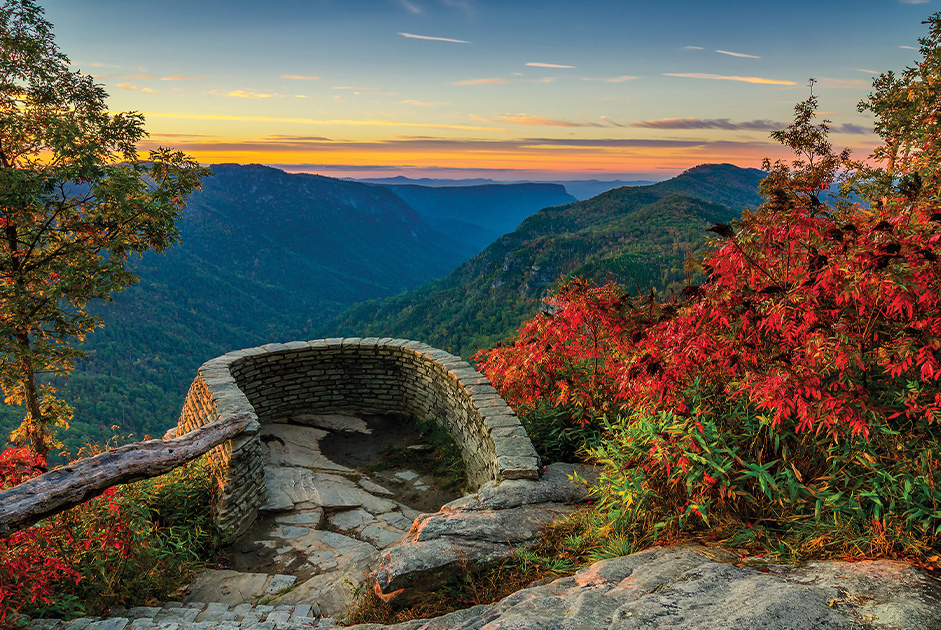A walk in nature walks the soul back home. – Mary Davis
Many say the most beautiful gorge in America is right here in North Carolina. The breathtaking views of Linville Gorge are North Carolina’s pride and its natural wonder. The people who visit are greeted with trails and views that are unforgettable and that rival the beauty of any other attraction on the map.
Sometimes called the “Grand Canyon of North Carolina” or the “Grand Canyon of the Southeast,” the Linville Gorge is easily one of the most dramatic landmarks you will ever see. It’s a place to enjoy overwhelming vistas, to go backpacking and rock climbing, and to explore the noteworthy ecology. Whether you’re making a short visit to one of the famous overlooks along the rim, or you’re spending a few days exploring its depths, the Linville Gorge will be etched in your mind forever.
As one of only two wilderness gorges in the South, this area covers over 11,000 acres around the Linville River, making for a wide expanse of stunning natural beauty in any season. Anywhere you look is a new awe-inspiring scene. The river is approximately 1,400 feet below the ridge, making hiking in and out of the Gorge quite challenging, but enjoyable for those who like serious hiking. The plant and animal community are very diverse, with a dense hardwood/pine forest and a wide variety of smaller trees and other plants as well as bear, fox, raccoon, trout, grouse, wild turkey, vultures, owls, hawks, copperheads, and timber rattlesnakes.
History:
Before the European colonization of North America, almost all of western North Carolina was inhabited by tribes of the Cherokee Indians. In the Cherokee language, the Linville River is called Ee-see-oh, which means “river of many cliffs”. Early white settlers named the river Linville in honor of John and William Linville, explorers who were scalped by the Shawnee while out hunting near the falls in 1766. A violent connection to such a dramatic, but also potentially dangerous place.
The steepness of the sides, the depth of the gorge, and the peaks of the Jonas Ridge to the east and Linville Mountain to the west made settlement of the area impractical to nearly impossible in the 1800s and 1900s. In the early 20th century, logging was a major industry in the surrounding region, but the gorge itself was spared. The prohibiting nature of the terrain made any major work endeavors there unprofitable, which is the main reason the gorge is one of few remaining examples of old growth forest in the Blue Ridge Mountains range. No industrial logging ever took place within the gorge, and its virgin forests span 10,000 acres. The gorge is also surprisingly free of manmade structures, and of the four major gorges in North Carolina, the Linville Gorge is the only one without a road in the bottom.
In 1952, formal protection of the area began when the land was purchased with funds donated by John D. Rockefeller. When the Wilderness Act was approved by Congress and signed into law by President Johnson in 1964, the Linville Gorge Wilderness became one of the first formally designated Wilderness areas of the new National Wilderness Preservation System.
Experiencing the Linville Gorge:
Linville Falls is a very popular destination in the vicinity, with easy to moderate hiking trails and excellent views of the mighty gorge. Another well-traveled spot is Wiseman’s View, a vantage on the edges of Linville Mountain that provides a magnificent and well-traveled overview of the gorge.
The Linville Gorge Wilderness includes about 40 miles of trails, offering extensive opportunities for both day hiking and backpacking. It’s important to note that given the severe terrain, these routes can be challenging, but they provide the most immersive experience of this immense landscape.
A free camping permit is needed on weekends and holidays from May through October. Group size is limited to 10 people. Each visitor or group can request one weekend permit per month and may stay up to 3 consecutive days and 2 nights. To reserve a permit, call the Grandfather Ranger District office between 8:00 am and 4:30 pm at 828-652-2144.




















